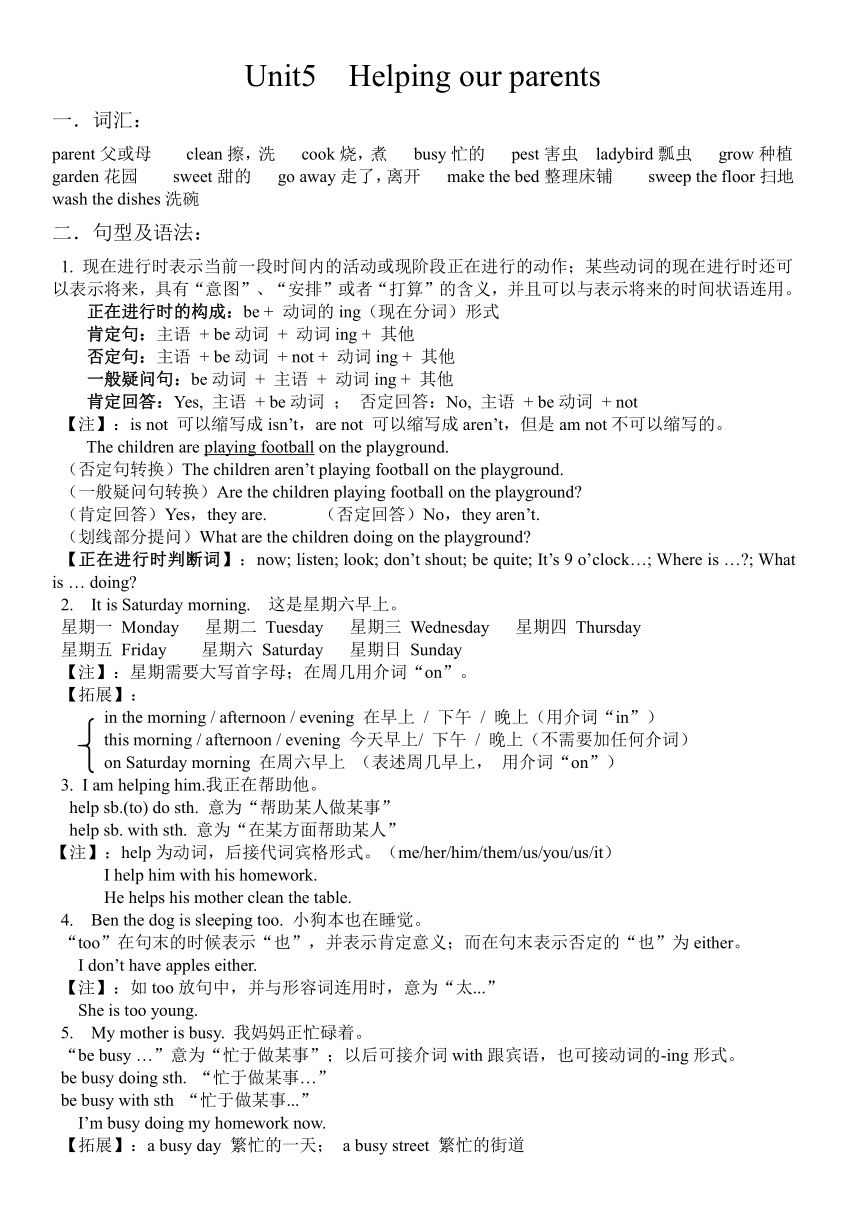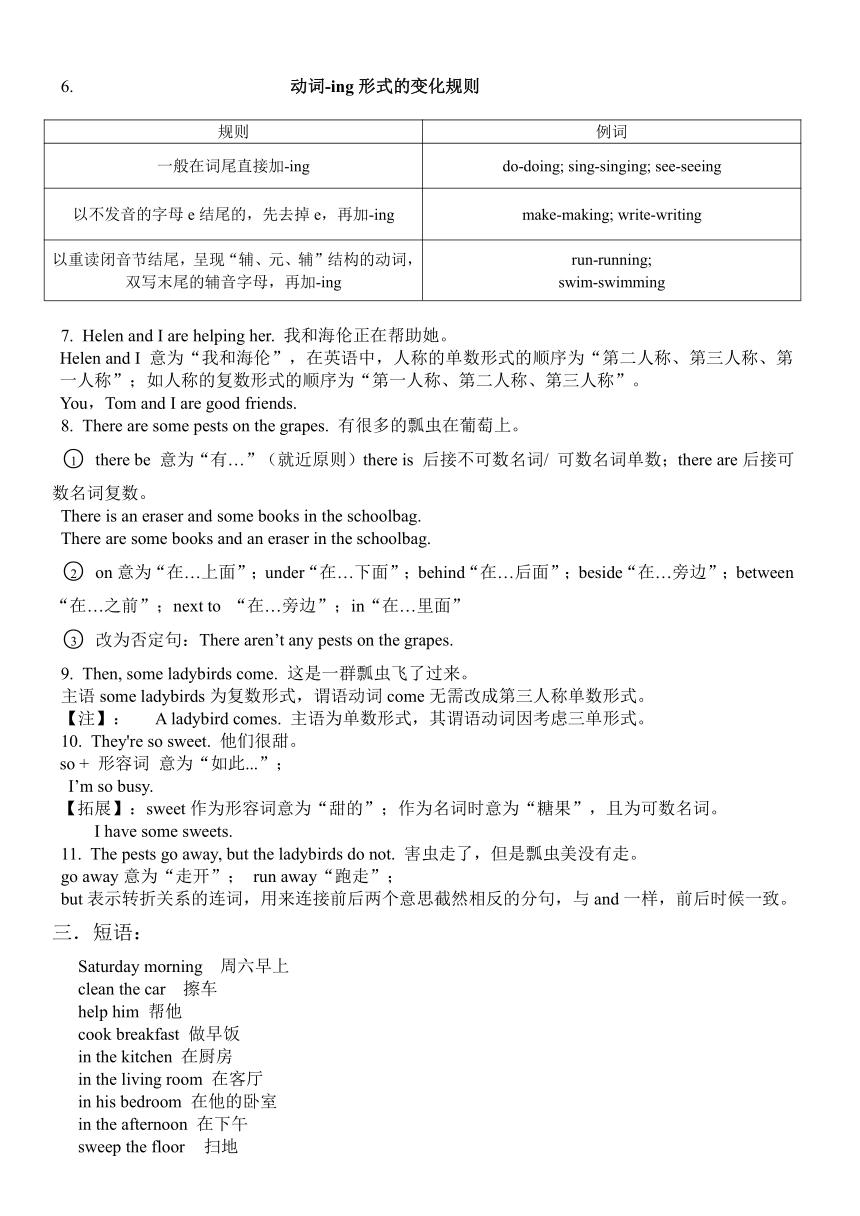Unit 5 Helping our parents 单元知识点清单
文档属性
| 名称 | Unit 5 Helping our parents 单元知识点清单 |

|
|
| 格式 | docx | ||
| 文件大小 | 23.7KB | ||
| 资源类型 | 教案 | ||
| 版本资源 | 牛津译林版 | ||
| 科目 | 英语 | ||
| 更新时间 | 2024-05-06 00:00:00 | ||
图片预览


文档简介
Unit5 Helping our parents
一.词汇:
parent父或母 clean擦,洗 cook烧,煮 busy忙的 pest害虫 ladybird瓢虫 grow种植
garden花园 sweet甜的 go away走了,离开 make the bed整理床铺 sweep the floor扫地 wash the dishes洗碗
二.句型及语法:
1. 现在进行时表示当前一段时间内的活动或现阶段正在进行的动作;某些动词的现在进行时还可以表示将来,具有“意图”、“安排”或者“打算”的含义,并且可以与表示将来的时间状语连用。
正在进行时的构成:be + 动词的ing(现在分词)形式
肯定句:主语 + be动词 + 动词ing + 其他
否定句:主语 + be动词 + not + 动词ing + 其他
一般疑问句:be动词 + 主语 + 动词ing + 其他
肯定回答:Yes, 主语 + be动词 ; 否定回答:No, 主语 + be动词 + not
【注】:is not 可以缩写成isn’t,are not 可以缩写成aren’t,但是am not不可以缩写的。
The children are playing football on the playground.
(否定句转换)The children aren’t playing football on the playground.
(一般疑问句转换)Are the children playing football on the playground
(肯定回答)Yes,they are. (否定回答)No,they aren’t.
(划线部分提问)What are the children doing on the playground
【正在进行时判断词】:now; listen; look; don’t shout; be quite; It’s 9 o’clock…; Where is … ; What is … doing
2. It is Saturday morning. 这是星期六早上。
星期一 Monday 星期二 Tuesday 星期三 Wednesday 星期四 Thursday
星期五 Friday 星期六 Saturday 星期日 Sunday
【注】:星期需要大写首字母;在周几用介词“on”。
【拓展】:
in the morning / afternoon / evening 在早上 / 下午 / 晚上(用介词“in”)
this morning / afternoon / evening 今天早上/ 下午 / 晚上(不需要加任何介词)
on Saturday morning 在周六早上 (表述周几早上, 用介词“on”)
I am helping him.我正在帮助他。
help sb.(to) do sth. 意为“帮助某人做某事”
help sb. with sth. 意为“在某方面帮助某人”
【注】:help为动词,后接代词宾格形式。(me/her/him/them/us/you/us/it)
I help him with his homework.
He helps his mother clean the table.
Ben the dog is sleeping too. 小狗本也在睡觉。
“too”在句末的时候表示“也”,并表示肯定意义;而在句末表示否定的“也”为either。
I don’t have apples either.
【注】:如too放句中,并与形容词连用时,意为“太...”
She is too young.
My mother is busy. 我妈妈正忙碌着。
“be busy …”意为“忙于做某事”;以后可接介词with跟宾语,也可接动词的-ing形式。
be busy doing sth. “忙于做某事…”
be busy with sth “忙于做某事...”
I’m busy doing my homework now.
【拓展】:a busy day 繁忙的一天; a busy street 繁忙的街道
动词-ing形式的变化规则
规则 例词
一般在词尾直接加-ing do-doing; sing-singing; see-seeing
以不发音的字母e结尾的,先去掉e,再加-ing make-making; write-writing
以重读闭音节结尾,呈现“辅、元、辅”结构的动词,双写末尾的辅音字母,再加-ing run-running; swim-swimming
Helen and I are helping her. 我和海伦正在帮助她。
Helen and I 意为“我和海伦”,在英语中,人称的单数形式的顺序为“第二人称、第三人称、第一人称”;如人称的复数形式的顺序为“第一人称、第二人称、第三人称”。
You,Tom and I are good friends.
There are some pests on the grapes. 有很多的瓢虫在葡萄上。
there be 意为“有…”(就近原则)there is 后接不可数名词/ 可数名词单数;there are后接可数名词复数。
There is an eraser and some books in the schoolbag.
There are some books and an eraser in the schoolbag.
on意为“在…上面”;under“在…下面”;behind“在…后面”;beside“在…旁边”;between“在…之前”;next to “在…旁边”;in“在…里面”
改为否定句:There aren’t any pests on the grapes.
Then, some ladybirds come. 这是一群瓢虫飞了过来。
主语some ladybirds为复数形式,谓语动词come无需改成第三人称单数形式。
【注】: A ladybird comes. 主语为单数形式,其谓语动词因考虑三单形式。
They're so sweet. 他们很甜。
so + 形容词 意为“如此...”;
I’m so busy.
【拓展】:sweet作为形容词意为“甜的”;作为名词时意为“糖果”,且为可数名词。
I have some sweets.
The pests go away, but the ladybirds do not. 害虫走了,但是瓢虫美没有走。
go away意为“走开”; run away“跑走”;
but表示转折关系的连词,用来连接前后两个意思截然相反的分句,与and一样,前后时候一致。
三.短语:
Saturday morning 周六早上
clean the car 擦车
help him 帮他
cook breakfast 做早饭
in the kitchen 在厨房
in the living room 在客厅
in his bedroom 在他的卧室
in the afternoon 在下午
sweep the floor 扫地
make the bed 整理床铺
cook dinner 做晚饭
wash the dishes洗碗
clean the table 擦桌子
eat fruit吃水果
watch TV看电视
wash clothes 洗衣服
grow grapes 种葡萄
big and sweet 又大又甜
on the grapes 在葡萄上
some ladybirds 一些瓢虫
go away 走了,离开
so sweet 真甜
in the garden 在花园里
一.词汇:
parent父或母 clean擦,洗 cook烧,煮 busy忙的 pest害虫 ladybird瓢虫 grow种植
garden花园 sweet甜的 go away走了,离开 make the bed整理床铺 sweep the floor扫地 wash the dishes洗碗
二.句型及语法:
1. 现在进行时表示当前一段时间内的活动或现阶段正在进行的动作;某些动词的现在进行时还可以表示将来,具有“意图”、“安排”或者“打算”的含义,并且可以与表示将来的时间状语连用。
正在进行时的构成:be + 动词的ing(现在分词)形式
肯定句:主语 + be动词 + 动词ing + 其他
否定句:主语 + be动词 + not + 动词ing + 其他
一般疑问句:be动词 + 主语 + 动词ing + 其他
肯定回答:Yes, 主语 + be动词 ; 否定回答:No, 主语 + be动词 + not
【注】:is not 可以缩写成isn’t,are not 可以缩写成aren’t,但是am not不可以缩写的。
The children are playing football on the playground.
(否定句转换)The children aren’t playing football on the playground.
(一般疑问句转换)Are the children playing football on the playground
(肯定回答)Yes,they are. (否定回答)No,they aren’t.
(划线部分提问)What are the children doing on the playground
【正在进行时判断词】:now; listen; look; don’t shout; be quite; It’s 9 o’clock…; Where is … ; What is … doing
2. It is Saturday morning. 这是星期六早上。
星期一 Monday 星期二 Tuesday 星期三 Wednesday 星期四 Thursday
星期五 Friday 星期六 Saturday 星期日 Sunday
【注】:星期需要大写首字母;在周几用介词“on”。
【拓展】:
in the morning / afternoon / evening 在早上 / 下午 / 晚上(用介词“in”)
this morning / afternoon / evening 今天早上/ 下午 / 晚上(不需要加任何介词)
on Saturday morning 在周六早上 (表述周几早上, 用介词“on”)
I am helping him.我正在帮助他。
help sb.(to) do sth. 意为“帮助某人做某事”
help sb. with sth. 意为“在某方面帮助某人”
【注】:help为动词,后接代词宾格形式。(me/her/him/them/us/you/us/it)
I help him with his homework.
He helps his mother clean the table.
Ben the dog is sleeping too. 小狗本也在睡觉。
“too”在句末的时候表示“也”,并表示肯定意义;而在句末表示否定的“也”为either。
I don’t have apples either.
【注】:如too放句中,并与形容词连用时,意为“太...”
She is too young.
My mother is busy. 我妈妈正忙碌着。
“be busy …”意为“忙于做某事”;以后可接介词with跟宾语,也可接动词的-ing形式。
be busy doing sth. “忙于做某事…”
be busy with sth “忙于做某事...”
I’m busy doing my homework now.
【拓展】:a busy day 繁忙的一天; a busy street 繁忙的街道
动词-ing形式的变化规则
规则 例词
一般在词尾直接加-ing do-doing; sing-singing; see-seeing
以不发音的字母e结尾的,先去掉e,再加-ing make-making; write-writing
以重读闭音节结尾,呈现“辅、元、辅”结构的动词,双写末尾的辅音字母,再加-ing run-running; swim-swimming
Helen and I are helping her. 我和海伦正在帮助她。
Helen and I 意为“我和海伦”,在英语中,人称的单数形式的顺序为“第二人称、第三人称、第一人称”;如人称的复数形式的顺序为“第一人称、第二人称、第三人称”。
You,Tom and I are good friends.
There are some pests on the grapes. 有很多的瓢虫在葡萄上。
there be 意为“有…”(就近原则)there is 后接不可数名词/ 可数名词单数;there are后接可数名词复数。
There is an eraser and some books in the schoolbag.
There are some books and an eraser in the schoolbag.
on意为“在…上面”;under“在…下面”;behind“在…后面”;beside“在…旁边”;between“在…之前”;next to “在…旁边”;in“在…里面”
改为否定句:There aren’t any pests on the grapes.
Then, some ladybirds come. 这是一群瓢虫飞了过来。
主语some ladybirds为复数形式,谓语动词come无需改成第三人称单数形式。
【注】: A ladybird comes. 主语为单数形式,其谓语动词因考虑三单形式。
They're so sweet. 他们很甜。
so + 形容词 意为“如此...”;
I’m so busy.
【拓展】:sweet作为形容词意为“甜的”;作为名词时意为“糖果”,且为可数名词。
I have some sweets.
The pests go away, but the ladybirds do not. 害虫走了,但是瓢虫美没有走。
go away意为“走开”; run away“跑走”;
but表示转折关系的连词,用来连接前后两个意思截然相反的分句,与and一样,前后时候一致。
三.短语:
Saturday morning 周六早上
clean the car 擦车
help him 帮他
cook breakfast 做早饭
in the kitchen 在厨房
in the living room 在客厅
in his bedroom 在他的卧室
in the afternoon 在下午
sweep the floor 扫地
make the bed 整理床铺
cook dinner 做晚饭
wash the dishes洗碗
clean the table 擦桌子
eat fruit吃水果
watch TV看电视
wash clothes 洗衣服
grow grapes 种葡萄
big and sweet 又大又甜
on the grapes 在葡萄上
some ladybirds 一些瓢虫
go away 走了,离开
so sweet 真甜
in the garden 在花园里
